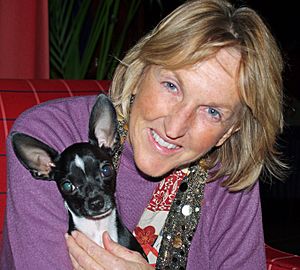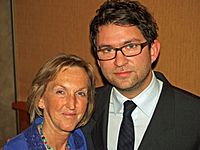Ingrid Newkirk facts for kids
Quick facts for kids
Ingrid Newkirk
|
|
|---|---|

Ingrid Newkirk with Little Man, her photographer's chihuahua, during an interview in 2007.
|
|
| Born |
Ingrid Elizabeth Ward
June 11, 1949 Kingston upon Thames, Surrey, England
|
| Citizenship | British-American |
| Occupation | Founder and President of People for the Ethical Treatment of Animals |
| Spouse(s) |
Steve Newkirk
(m. 1968; div. 1980) |
Ingrid Elizabeth Newkirk (born June 11, 1949) is a British-American animal rights activist and author. She is best known as the president of People for the Ethical Treatment of Animals (PETA), which is the world's largest animal rights organization.
In March 1980, Newkirk and fellow activist Alex Pacheco started PETA. They gained major public attention in 1981 with the Silver Spring monkeys case. Pacheco took photos of 17 monkeys being used for experiments in a research lab in Silver Spring, Maryland. This led to the first-ever police raid on an animal lab in the United States. It also helped change the Animal Welfare Act in 1985 to better protect animals.
Since then, Newkirk has led many campaigns. She has worked to stop the use of animals in car crash tests and convinced many companies to stop testing cosmetics on animals. She has also organized secret investigations into how animals are treated. These investigations have led to government action against companies and universities that were not treating animals properly.
Newkirk's work is sometimes controversial. Some people disagree with her support for groups like the Animal Liberation Front. PETA has also been criticized for putting down many animals in its shelters. Newkirk believes that "a rat is a pig is a dog is a boy," meaning that all living beings deserve respect and have rights.
Contents
Early Life and Career
Childhood Experiences
Ingrid Newkirk was born in Kingston upon Thames, England, in 1949. She spent her early years in Scotland and England. When she was seven, her family moved to New Delhi, India. Her father was an engineer for the government. Her mother volunteered to help people with a serious skin disease called leprosy.
Newkirk attended a boarding school in the Himalayas. She also helped her mother with her volunteer work. She packed pills, rolled bandages, and fed stray animals. She said this taught her that anyone in need, including animals, deserves help.
One day in New Delhi, she saw a group of people being cruel to a dog. The dog later died in her arms. She said this event was a turning point in her life and made her want to protect animals.
When she was 18, her family moved to Florida. There, she met and married Steve Newkirk in 1968. They divorced in 1980.
Working in Animal Shelters
Until she was 21, Newkirk hadn't thought much about animal rights. In 1970, she took some abandoned kittens to an animal shelter. She was shocked to learn they were put down, or euthanized, right away. The shelter was in poor condition, and she felt she had to do something.
She started working at the shelter and saw that many animals were not treated well. She studied animal care and how to investigate animal cruelty. Newkirk reported the problems she saw. She felt that putting the animals to sleep peacefully was better than letting them suffer in the shelter.
Later, she became an animal-protection officer and then Washington, D.C.'s first female poundmaster (head of an animal shelter). She improved conditions by getting money for veterinary services, an adoption program, and a program to spay and neuter pets to control the animal population.
Leading People for the Ethical Treatment of Animals (PETA)
How PETA Was Started

In 1980, Newkirk met Alex Pacheco, who introduced her to the idea of animal rights. He gave her the book Animal Liberation by Peter Singer. The book explained that treating animals differently just because they are not human is unfair. This is similar to other kinds of unfair discrimination.
Newkirk felt the book put her own feelings into words. In March 1980, she and Pacheco started PETA to teach the public about animal rights. At first, it was just a small group of people working out of a basement.
The Silver Spring Monkeys Case
The Silver Spring monkeys case made PETA famous. In 1981, Pacheco began working as a volunteer inside a research lab in Maryland. A scientist named Edward Taub was doing experiments on 17 monkeys. He had operated on their nerves so they could not feel their arms and legs. Then, he forced them to try to use their limbs.
Pacheco took photos at night to show the poor conditions the monkeys lived in. Newkirk helped him by acting as a lookout. The photos were very disturbing and showed the animals were suffering.
Newkirk and Pacheco gave the evidence to the police. The police raided the lab and rescued the monkeys. It was the first police raid on an animal research lab in the U.S. The case led to changes in the Animal Welfare Act to give research animals more protection. It also made PETA an internationally known organization, with Newkirk as its president.
Public Attention and Views
Newkirk is known for using media attention to highlight animal rights issues. She often organizes bold campaigns to get people talking. She once said that PETA has an obligation to make waves and not just be polite.
Her actions have led to strong opinions, both positive and negative. Some people admire her dedication. Actor Alec Baldwin called her a "heroine" and a "champion" for animals. Others find her methods too extreme.
Newkirk and PETA have been criticized for putting down animals in their shelters. Critics say it's wrong for PETA to do this while speaking out against killing animals for other reasons. Newkirk explains that PETA runs an "open-admission" shelter, meaning they don't turn any animal away. She says that with so many homeless animals and not enough good homes, putting them down peacefully is a "tragic necessity" to prevent worse suffering.
She is strongly against animal testing. When asked if she would support experiments on animals to cure a major disease, she replied by asking if the person would support experiments on their own child for the same reason. This shows her belief that animal lives have value, just like human lives.
Awards
- Washingtonian of the Year, 1980
- Courage of Conscience Award, 1995
- Shining World Compassion Award, 2007
- Ahimsa Award, 2014
- Peter Singer Prize for Strategies to Reduce the Suffering of Animals, 2016
Books by Ingrid Newkirk
- Animalkind: Remarkable Discoveries About Animals and Revolutionary New Ways to Show Them Compassion (2020)
- The PETA Practical Guide to Animal Rights (2009)
- One Can Make a Difference (2008)
- Let's Have a Dog Party! (2007)
- 50 Awesome Ways Kids Can Help Animals (2006)
- Making Kind Choices (2005)
- Free the Animals: The Story of the Animal Liberation Front (2000)
- You Can Save the Animals: 251 Simple Ways to Stop Thoughtless Cruelty (1999)
- Compassionate Cook: Please don't Eat the Animals (1993)
- Kids Can Save the Animals: 101 Easy Things to Do (1991)
See also
 In Spanish: Ingrid Newkirk para niños
In Spanish: Ingrid Newkirk para niños
- Women and animal advocacy
- List of animal rights advocates
 | Mary Eliza Mahoney |
 | Susie King Taylor |
 | Ida Gray |
 | Eliza Ann Grier |


